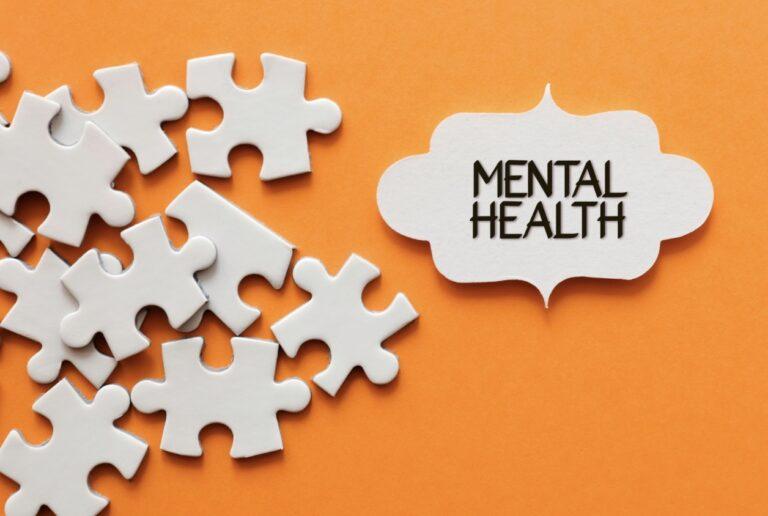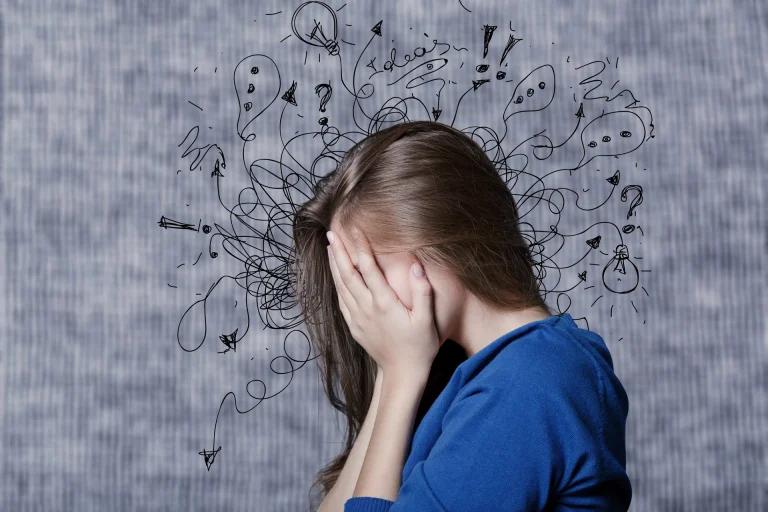Good sleep health is essential for maintaining good mental health and emotional regulation. In this blog post, we’ll explore the connection between sleep and mental health, including how insomnia and other sleep disorders can affect our emotional well-being. We’ll also provide some tips on how to improve both your sleep and your mental health. If you’re struggling with either of these issues, keep reading!
Understanding Insomnia and Mental Health
Insomnia and mental health are closely related in fact there is a bidirectional relationship between them. Insomnia is the inability to fall or stay asleep, which can be caused by a variety of factors such as stress and anxiety. When left untreated, insomnia can lead to both physical and psychological problems.
Research has shown that there is a strong link between insomnia and depression, with individuals who suffer from chronic insomnia being more likely to develop depression. Additionally, those with bipolar disorder may experience worsened symptoms due to lack of sleep. Proper diagnosis and treatment of underlying sleep disorders is crucial for maintaining emotional health and preventing further development of these issues.
What is Insomnia?
Insomnia is a sleep disorder that affects millions of people worldwide. It is characterised by difficulty falling or staying asleep, resulting in poor quality and quantity of sleep. There are two types of insomnia: acute and chronic. Acute insomnia lasts for a short period, usually a few nights, while chronic insomnia lasts for several weeks or months.
Causes of insomnia can vary from person to person but some common ones include anxiety, depression, bipolar disorder, developmental issues, as well as emotional health and responses. Some other causes may include medical conditions such as asthma or arthritis that cause pain at night making it hard to fall asleep. A noisy sleeping environment can also contribute to poor quality sleep leading to Insomnia.
- Chronic Insomnia
- Acute Insomnia
- Difficulty falling/staying asleep
- Poor quality/quantity of sleep
According to the NHS, the amount of sleep a healthy adult usually needs is around 7 to 9 hours of sleep. Adolescents, children and babies need more sleep, because they are still growing, but that varies too, with a newborn sleeping anywhere between 8 to 16 hours.
How Insomnia Affects Mental Health Problems
Insomnia can have a negative impact on mood and emotions, leading to issues such as depression and anxiety. When we don’t get enough restful sleep, our emotional responses are often heightened, making it harder for us to regulate our feelings and cope with stressful situations. Furthermore, insomnia can impair cognitive function by affecting attention span, memory consolidation, and decision-making abilities.
Insomnia can increase the risk of developing mental health conditions and physical health problems.
There is also a close relationship between sleep and physical health. Chronic insomnia has been linked to an increased risk of developing conditions such as bipolar disorder and depression. Additionally, poor sleep quality has been associated with a range of physical health problems like heart disease and obesity. Therefore it’s important for patients experiencing symptoms of insomnia or other mental health disorders to prioritise getting adequate amounts of restorative sleep each night, in order to mitigate potential negative impacts on their emotional health as well as their overall well-being.
The Link Between Insomnia and Depression
The relationship between insomnia and depression is a complex one, with each condition often exacerbating the other. While it’s difficult to determine which comes first in the “chicken or egg” debate, research shows that sleep disturbances can act as early symptoms of depression. Additionally, chronic insomnia can lead to what is known as “post-insomniac” depression, a type of depression that differs from regular depression in its development and emotional responses.
To better understand the link between insomnia and depression, here are some key points to consider:
- Insomnia can be both a cause and effect of mood disorders like anxiety and bipolar disorder
- Chronic sleep deprivation disrupts healthy emotional functioning, leading to issues such as irritability, impulsivity, and negative thinking patterns
- Post-insomniac depression may manifest differently than typical depressive symptoms with unique physical manifestations like fatigue or weakness
It’s important for patients struggling with either condition to seek professional help from mental health experts who can provide tailored treatments designed around individual needs. Addressing underlying causes of poor sleep habits through therapy or medication management strategies aimed at improving overall emotional health will ultimately improve the quality of life for those experiencing these co-existing conditions.
The Connection Between Insomnia and Anxiety
Anxiety can be a major cause of insomnia, with racing thoughts and worry making it difficult to fall asleep or stay asleep. This lack of sleep can then exacerbate anxiety symptoms, creating a vicious cycle that can be difficult to break. To manage anxiety-induced insomnia, it’s important to practice good sleep hygiene such as sticking to a regular sleep schedule and avoiding caffeine before bed. Relaxation techniques like meditation or deep breathing exercises may also help calm the mind.
In addition to coping strategies, seeking professional support for both anxiety and insomnia issues is essential for overall emotional health and well-being. With proper treatment, including therapy or medication if necessary, those with bipolar disorder or other mental health conditions affecting their emotional responses may find relief from both anxiety and insomnia symptoms.
Sleep Disorders and Mental Health
Getting enough quality sleep is crucial for maintaining good mental health. Sleep disorders like sleep apnea, narcolepsy, and restless leg syndrome can negatively impact the quality of our sleep, leading to a host of mental health issues such as depression and anxiety.
Sleep apnea is linked with a higher risk of developing depression and anxiety. Narcolepsy has been shown to contribute to symptoms such as mood swings, irritability, and difficulty concentrating. Restless leg syndrome can cause insomnia or disrupted sleep patterns, which may exacerbate symptoms of anxiety and depression. It’s essential for those struggling with these conditions to seek medical attention in order to address both their physical symptoms and potential mental health concerns, that may arise from a lack of proper restorative sleep.
Sleep Apnea and Mental Health
Untreated sleep apnea can have a significant impact on mental health. Symptoms of sleep apnea include snoring, gasping for air during sleep, and daytime fatigue. If left untreated, it can lead to depression, anxiety, and even memory problems.
The good news is that treatment options are available for sleep apnea. These include lifestyle changes like weight loss and exercise, to using continuous positive airway pressure (CPAP) machines or oral appliances to help keep the airways open during sleep. Seeking medical advice if you suspect you have symptoms of sleep apnea is crucial, in order to prevent further negative effects on your mental health.
Narcolepsy and Mental Health
Understanding narcolepsy is important for managing the condition and improving overall well-being. Narcolepsy is a chronic neurological disorder that affects the brain’s ability to regulate sleep-wake cycles, causing excessive daytime sleepiness and sudden attacks of muscle weakness (cataplexy). This can impact mental health by leading to feelings of frustration, anxiety, depression, and low self-esteem.
Managing narcolepsy involves creating a healthy sleep routine with regular bedtimes and waking times. Medications may also be prescribed to help manage symptoms. It’s essential to work closely with healthcare professionals who specialize in treating narcolepsy as they can provide guidance on lifestyle modifications, and medication management while addressing any comorbidities that may affect overall well-being, such as depression or anxiety disorders. Managing narcolepsy effectively through medication and lifestyle changes can improve one’s mental health status significantly.
Restless Leg Syndrome and Mental Health
Restless Leg Syndrome (RLS) is a neurological disorder that causes an irresistible urge to move the legs, especially at night. RLS symptoms can also include tingling or burning sensations in the legs, which can interfere with sleep and lead to daytime fatigue. While RLS is primarily a physical condition, it has been linked to mood disorders such as depression and anxiety, due to its impact on quality of life.
The impact of RLS on mental health can be significant, as the lack of restful sleep may exacerbate symptoms of mood disorders and increase feelings of stress and frustration. Effective treatments for RLS include medications like dopamine agonists or iron supplements for those with low iron levels. Lifestyle changes that promote better sleep hygiene, such as avoiding caffeine before bedtime may also help alleviate symptoms. For those struggling with both RLS and mental health conditions, seeking support from healthcare professionals specializing in both areas may provide relief from these interconnected issues.
Tips for Improving Sleep and Mental Health
Getting enough sleep is crucial for maintaining good mental health. To improve your sleep problems and mental health, try establishing a regular sleep routine and sticking to it every day. This can include going to bed and waking up at the same time each day, even on weekends.
Creating a relaxing sleep environment can also help you get better rest. Consider making your bedroom dark, cool, quiet, and comfortable with pillows and blankets that suit your preferences. Limiting screen time before bed is another important step to take since blue light from electronic devices can interfere with natural circadian rhythms that regulate sleep-wake cycles. By taking these steps towards a good night’s sleep you will soon feel an improvement in both physical and emotional wellbeing!
Establish a Regular Sleep Routine
Going to bed and waking up at the same time every day can greatly improve your sleep routine. This consistency helps regulate your body’s internal clock, making it easier to fall asleep and wake up naturally. Additionally, avoiding daytime naps can help ensure that you are tired enough to get a good night’s rest.
Setting a bedtime routine can also be helpful in establishing a regular sleep pattern. This could include activities such as reading or taking a warm bath before bed, which signals to your brain that it is time for rest. By prioritizing regularity and creating habits around bedtime, you may find yourself feeling more rested and mentally refreshed each morning.
Create a Relaxing Sleep Environment
A comfortable and peaceful sleep environment can greatly impact good quality sleep. It’s essential to use comfortable bedding and pillows that cater to your personal preferences for optimal comfort. Additionally, keeping your bedroom cool, quiet, and dark will help create a relaxing atmosphere conducive to sleep. If you struggle with external noises disrupting your rest, consider using white noise or calming music that can help soothe you into a peaceful slumber. By prioritizing these simple changes in your sleeping space, you may begin to notice improvements in both the quantity and quality of your sleep – leading to better mental health outcomes overall.
Limit Screen Time Before Bed
Avoid electronic devices for at least an hour before sleep to improve your sleep quality. The blue light emitted by screens can interfere with the production of melatonin, a hormone that regulates your sleep-wake cycle. Instead of scrolling social media or watching TV, try reading a book before bed.
Using your phone as an alarm clock in bed might be tempting and convenient, but it can disrupt your sleep patterns. Notifications from emails or messages may also disturb you during the night and affect the quality of your rest. Consider using a traditional alarm clock or placing your phone away from your reach while sleeping to avoid temptation.
In conclusion, reducing screen time before bed is crucial for good quality rest and maintaining mental health. By avoiding electronic devices for at least an hour before sleeping and opting for relaxing activities such as reading instead, patients can improve their overall well-being through better sleep habits.
Practice Stress-Reducing Techniques
To improve your sleep and reduce stress, try relaxation techniques like deep breathing or meditation before bedtime. These can help calm your mind and prepare you for a deeper, more restful sleep. Additionally, regular exercise has been shown to lower stress levels and promote better sleep quality.
Avoiding caffeine, alcohol, and nicotine close to bedtime can also significantly impact the quality of your sleep. Caffeine is a stimulant that can make it difficult to fall asleep or stay asleep while alcohol may disrupt the balance of REM (rapid eye movement) and non-REM stages of sleep.
By incorporating these practices into your routine, you may be able to reduce feelings of stress and anxiety which in turn could have an overall positive effect on both mental health and quality of life.
Talk to Your Doctor About Sleep and Mental Health
When it comes to mental health, sleep plays an important role in maintaining our overall well-being. If you’re struggling with sleep or have concerns about the quality of your rest, it’s important to talk with your doctor. Here are some things to discuss:
- Any difficulties falling asleep or staying asleep
- Whether you experience daytime fatigue or drowsiness
- The impact of poor sleep on your mood and functioning
A health professional can help explore possible causes for your problems sleeping, provide guidance on interventions that promote better rest, and offer treatments if needed.
If you’re dealing with insomnia or other types of sleep disorders, there are a range of options available depending on the underlying cause. These could include cognitive-behavioural therapy (CBT), medications such as sleep medicine or antidepressants, or lifestyle changes like exercise and relaxation techniques.
In addition to addressing specific sleep difficulties, be sure to ask about any mental health support services that might be available. Your doctor may be able to connect you with resources such as counselling services or support groups that can help address any related mental illness such as anxiety, depression, schizophrenia, psychiatric disorders, post-traumatic stress disorder, attention-deficit/hyperactivity disorder, stress management issues and so forth.
Sources
- Mental Health and Sleep – Sleep Foundation
- Sleep problems – NHS
- Sleep and Chronic Disease – CDC
Medical Disclaimer
NowPatient has taken all reasonable steps to ensure that all material is factually accurate, complete, and current. However, the knowledge and experience of a qualified healthcare professional should always be sought after instead of using the information on this page. Before taking any drug, you should always speak to your doctor or another qualified healthcare provider.
The information provided here about medications is subject to change and is not meant to include all uses, precautions, warnings, directions, drug interactions, allergic reactions, or negative effects. The absence of warnings or other information for a particular medication does not imply that the medication or medication combination is appropriate for all patients or for all possible purposes.










